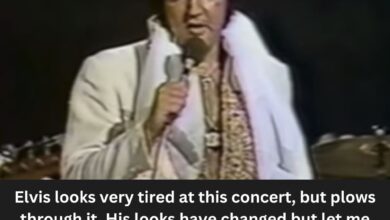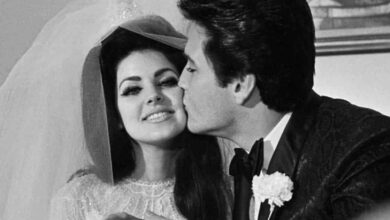His Voice Combined With This Song Is Pure Perfection
Elvis Presley’s interpretation of “What Now My Love” during his 1973 Las Vegas live performances remains a standout moment in his illustrious career. The song, originally composed by French artist Gilbert Bécaud as “Et Maintenant” and later translated into English by Carl Sigman, is known for its poignant and emotionally charged lyrics. In Elvis’s hands, the song transforms into a powerful expression of despair and heartbreak, showcasing his unparalleled vocal talent and stage presence.
During the 1970s, Elvis was a regular performer in Las Vegas, where he developed a reputation for delivering electrifying live shows. “What Now My Love” became a staple of his setlist, resonating deeply with audiences who were captivated by his emotive delivery. The orchestration of the song, characterized by its sweeping strings and dramatic horns, complemented Elvis’s dynamic vocal performance, creating an atmosphere of intense emotion and drama.
Elvis’s ability to connect with his audience was one of his most remarkable talents. When performing “What Now My Love,” he conveyed a deep sense of personal pain and vulnerability, particularly evident in the lines, “What now my love? Now that you’ve left me, how can I live through another day?” His interpretation of the song went beyond mere performance; it felt like a shared experience of heartache, drawing the audience into his emotional world.
The technical prowess of Elvis’s voice during these performances was extraordinary. He effortlessly navigated the song’s wide vocal range, from its soft, tender beginnings to its powerful, soaring crescendos. This mastery of his vocal instrument allowed him to imbue the song with a raw intensity that left a lasting impression on those who witnessed it.
Elvis’s rendition of “What Now My Love” was more than just a highlight of his Las Vegas shows; it was a reflection of his broader career and life. By the early 1970s, Elvis had experienced significant personal and professional challenges, and his performances often reflected a deeper, more introspective side of his artistry. This song, with its themes of loss and longing, seemed to mirror his own struggles and resonated with his fans on a profound level.
In addition to his live performances, Elvis’s studio recordings of the time further showcased his ability to interpret and breathe new life into a wide variety of songs. Known for his versatility, Elvis could transition seamlessly between genres, from rock and roll to gospel, and from blues to ballads like “What Now My Love.” This adaptability was a key factor in his enduring success and widespread appeal.
Elvis Presley, born in 1935 in Tupelo, Mississippi, rose to fame in the mid-1950s with his innovative blending of various musical genres. His charismatic stage presence, combined with his distinctive voice, made him a cultural icon and a driving force in the development of rock and roll. Over the years, he became known not only for his groundbreaking music but also for his impact on fashion and pop culture.
Throughout his career, Elvis faced numerous personal challenges, including health issues and the pressures of fame. Despite these difficulties, he remained a consummate performer, dedicated to his craft and his fans. His performances in Las Vegas during the 1970s are often seen as a testament to his resilience and enduring talent. Songs like “What Now My Love” highlight his ability to connect deeply with his audience, making each performance a memorable and moving experience.
Elvis Presley’s legacy continues to influence musicians and entertainers around the world. His rendition of “What Now My Love” is remembered not only as a highlight of his Las Vegas shows but also as a powerful example of his emotive singing and charismatic stage presence. It remains a beloved part of his repertoire, showcasing the depth and breadth of his musical talent and his lasting impact on the world of music.



